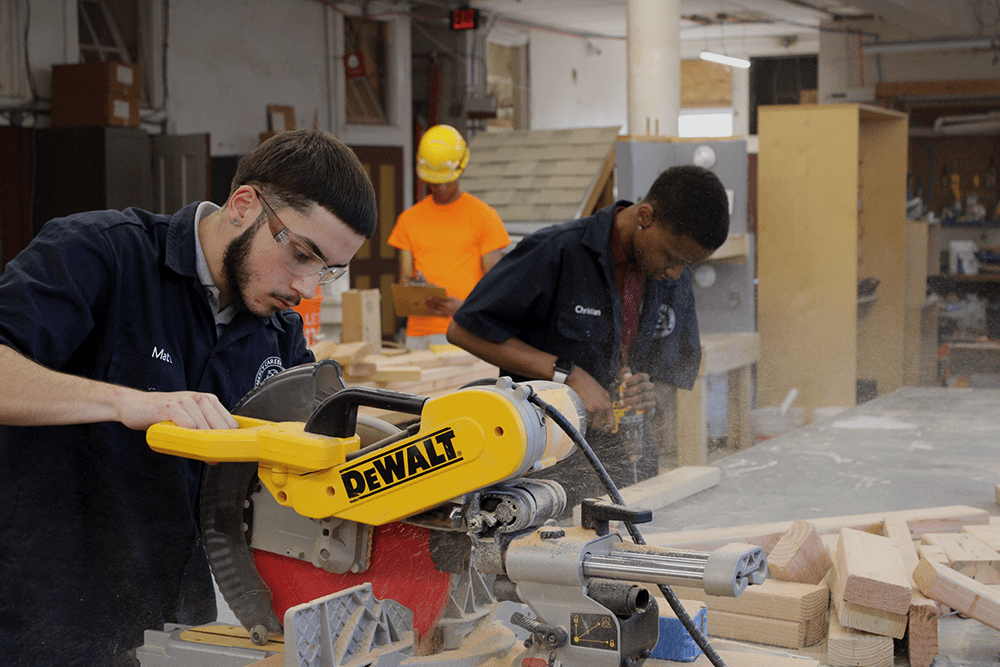
WASHINGTON — Decades ago, high schools offered a range of practical classes — home economics, wood shop, and auto repair — amid their academic lineup for interested students. Most schools eventually dropped these classes because of lack of funding, but a version of them has returned with renewed vigor in public schools and some Catholic schools across the country.
The current courses, called Career Technical Education (or CTE for short), are meant to train students in specific career paths such as business, health, building industry and technology, not just teach them some practical skills.
Some schools offer these classes as part of their overall program while some others are solely devoted to vocational training, now called tech schools. There are also two Catholic high schools in the U.S. with this distinction: Philadelphia’s Mercy Career & Technical High School, known as Mercy Tech, which began in 1950, and St. Peter Catholic, a career and technical school in Houston, which opened for its first class of freshman students last fall.
The rise in school career training programs stems from a growing realization that college might not be for everyone and not everyone can afford it and there are shortages in the labor market where skilled workers are needed.
The Mercy Sisters saw this need 75 years ago when they were training students in the school basement in sewing, carpentry, and baking.
Now the school, a sponsored ministry of the Institute of the Sisters of Mercy of the Americas, provides training to its 350 students in seven different areas: advertising and design, building trades, business, IT solutions, cosmetology, culinary and pastry art, and health occupations.
Mercy Sister Susan Walsh, the school’s interim president, who has served in various capacities at the school for nearly 30 years, told The Tablet that when these students graduate with their high school diplomas and certified training certificates they are “ready to work in their careers.”
Some might go on to college, and others might go straight to work, she said.
Sister Walsh said the school has a good reputation and gets a lot of support. “People believe in us and in what we’re doing.”
She added that Mercy Tech works with local businesses who have told the school’s leaders to train the students’ attitudes: “We will give them skills.”
Sister Walsh said one of the best things for these students is the confidence building. If academics don’t come easily to some, she said, they can be the best carpenter or make the best cake.
“It’s a wonderful place,” she adds, before saying she “could be a little prejudiced” because she has spent a lot of her life at this school.
For years, she and the other school leaders at the Philadelphia school were proud to say their school was one of a kind, but now another Catholic career-oriented high school recently opened in Houston.
St. Peters, established by the Archdiocese of Galveston-Houston along with community partners, opened this fall for freshmen and will add a grade each year. For now, the career paths taught at the school focus on construction, business, and information technology.
On its website the school says that it has also built “life skills into the curriculum” that include personal finance, resume development, and personal marketing. “These life lessons, which are often not formally introduced to students, will help them navigate life after school and better prepare them for a career or continuing education.”
A spokesperson for the National Catholic Educational Association said their organization does not collect data on Catholic trade schools but will likely begin to.
A few Catholic post-secondary trade schools have also recently opened in the U.S., or plan to open soon, focusing not just on specific skill sets but also emphasizing spiritual growth.
Santiago Trade School, just outside Silverado, California, on the property of the Santiago Retreat Center, opened last fall with five male students and classes in construction as well as philosophy and theology.
St. Joseph the Worker in Steubenville, Ohio, will open this fall as a coed school with training in carpentry, HVAC, plumbing, and electrical work. In the fourth year of the program, students will take part in an apprentice program.
Harmel Academy of the Trades in Grand Rapids, Michigan, which opened four years ago as a school for young men combines carpentry trade and a Catholic humanities curriculum, and Kateri College in Gallup, New Mexico, plans to open its coed program next fall offering students a four-year liberal arts bachelor’s degree program and certification in a specific trade.
